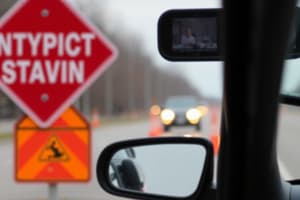Podcast
Questions and Answers
What does DWI stand for?
What does DWI stand for?
- Driving Without Insurance
- Driving With Impairment
- Driving While Intoxicated (correct)
- Driving With Intention
What is considered excessive B.A.C.?
What is considered excessive B.A.C.?
.08 or more
A person is presumed to have consented to a chemical test if they operate a vehicle.
A person is presumed to have consented to a chemical test if they operate a vehicle.
True (A)
A _____ Offender is one with prior intoxication related offenses.
A _____ Offender is one with prior intoxication related offenses.
Leaving the scene of an accident becomes a Class D felony if the accident results in serious injury.
Leaving the scene of an accident becomes a Class D felony if the accident results in serious injury.
What is a Class B misdemeanor in terms of B.A.C.?
What is a Class B misdemeanor in terms of B.A.C.?
A test may be administered to anyone who is unconscious without consent.
A test may be administered to anyone who is unconscious without consent.
What is a Chronic Offender classified as?
What is a Chronic Offender classified as?
What penalty does a persistent B.A.C. offender receive?
What penalty does a persistent B.A.C. offender receive?
What happens to a driver's license if they refuse a chemical test?
What happens to a driver's license if they refuse a chemical test?
Under 21 drivers can experience a zero tolerance law resulting in a loss of license.
Under 21 drivers can experience a zero tolerance law resulting in a loss of license.
What class of felony is a habitual B.A.C. offender?
What class of felony is a habitual B.A.C. offender?
Under RSMO 577.020, who does it apply to?
Under RSMO 577.020, who does it apply to?
If a DWI arrest occurs only on private property, the implied consent law can still be invoked.
If a DWI arrest occurs only on private property, the implied consent law can still be invoked.
A person expressing an unequivocal refusal means a test may not be _____ administered.
A person expressing an unequivocal refusal means a test may not be _____ administered.
Which of the following is not an additional evidence for DWI?
Which of the following is not an additional evidence for DWI?
Flashcards are hidden until you start studying
Study Notes
DWI and DUI Definitions
- DWI (Driving While Intoxicated) is an intoxication-related traffic offense.
- Excessive B.A.C. (Blood Alcohol Concentration) indicates alcohol impairment, with a level of 0.08 or higher presumptively intoxicated.
- DUI (Driving Under the Influence) refers to operating a vehicle while impaired by substances.
- Operating a vehicle while intoxicated that leads to injury or death is a severe charge.
Offender Classifications
- Habitual Offender: Defined as five or more intoxication-related offenses, or prior offenses involving injury or death. Must serve 85% of the sentence.
- Chronic Offender: Four or more intoxication-related offenses, or three where at least one involved injury or death.
- Aggravated Offender: Three or more intoxication-related offenses, with at least two resulting in injury or death.
- Persistent Offender: Two or more intoxication-related offenses on separate occasions.
- Prior Offender: One intoxicated offense within five years.
DWI Felony Classes
- Class B Misdemeanor: First-time DWI offense.
- Class A Misdemeanor: Prior offense or presence of a minor under 17 years in the vehicle.
- Class E Felony: Persistent offender status or criminal negligence causing physical injury.
- Class D Felony: Aggravated offender or criminal negligence leading to injury of law enforcement or emergency personnel.
- Class C Felony: Chronic offender or criminal negligence causing serious injury or death.
- Class B Felony: Habitual offender status or criminal negligence causing multiple deaths or death to law enforcement personnel with excessive B.A.C.
- Class A Felony: Subsequent Class B felony DWI after a previous conviction.
DWI Testing and Consent
- DWI charges can be dismissed with prejudice if B.A.C. is below 0.08, unless additional evidence suggests otherwise.
- Refusal to submit to a breath test can lead to revocation of the driver's license.
- Drivers are presumed to consent to chemical testing upon operating a vehicle.
- Officers can administer tests to deceased or incapacitated individuals.
Penalties and License Implications
- Underage drivers (under 21) with a B.A.C. of 0.02 or more face license suspension under Zero Tolerance Law.
- First-time excessive B.A.C. penalties include a 30-day suspension followed by a 60-day restriction.
- Subsequent excessive B.A.C. offenses within five years result in a one-year revocation, requiring proof of financial responsibility and passing a driver’s exam.
Leaving the Scene of an Accident
- It is a Class A misdemeanor to leave the scene of an accident without providing identification when injuries or damages occurred.
- When injury results from leaving the scene, it escalates to a Class E felony, and a Class D felony if it results in death.
Law Enforcement Protocol
- Officers must arrest individuals suspected of DWI/DUI within one and a half hours unless specific conditions apply.
- An express refusal to take a test results in the immediate revocation of driving privileges.
- D.O.R. may revoke or deny licenses for up to one year based on prior offenses or violations.
- Alcoholic content testing must be conducted by officers with valid permits issued by the state.
Misconceptions and Clarifications
- It is incorrect to assume operating under a B.A.C. of 0.08% or 0.02% for minors is a criminal offense; it is administrative.
- The implied consent law does not apply on private property, but officers can request voluntary testing.
- Contesting implied consent issues must occur in court.
Other Relevant Laws
- RSMO 577.020 covers regulations regarding breath testing and the rights of arrested individuals.
- Zero Tolerance Law enforces strict penalties for underage drinking and driving offenses.
- The "Automatic Administrative Suspension or Revocation" law aims to address DWI incidents effectively without full court proceedings.
Studying That Suits You
Use AI to generate personalized quizzes and flashcards to suit your learning preferences.




